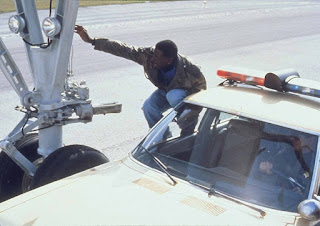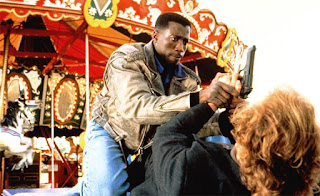Once upon a time, action movie heroes didn't have to save the world to prove their worth. They could just, you know, save the day. They could just be an ordinary (if sometimes well trained) person at the right place and the right time and come between innocent people and terrorists, hijackers, what have you. And that was enough. They didn't have to have super powers. They could just be very good at kicking ass, something that the average person isn't. As a lifelong comic book aficionado, I'm all for superheroes in gaudy costumes and flashy powers but just the same I do miss the type of action movies that the current Marvel/DC landscape doesn't leave much room for. Even the supposedly regular people in today's action movies, whether it be in the Fast and Furious films or in one of the many Mission: Impossible's have to be able to accomplish extraordinary, superhuman feats. In today's world, the unassuming likes of Passenger 57 would never get off the ground. It would barely even qualify as an action movie.
When it was released on November 6th, 1992, Passenger 57 was, in every way, standard issue early '90s fare. Coming four years after Die Hard, it's another story of a snooty, arrogant British terrorist who sees their plans up ended by the intervention of a regular Joe who just happened to be there. Wesley Snipes is John Cutter, the titular 57th passenger, aboard a plane that, by chance, is also transporting international terrorist Charles Rane (Bruce Payne), who's been apprehended and is on his way to face justice. It will surprise no one that Rane has plotted his escape in advance and that his associates are already on the plane, some as passengers, some among the plane's staff (in an early role, Elizabeth Hurley plays Rane's second-in-command, posing as a flight attendant).
A former cop and retired Secret Service agent who's been working as a security consultant for airlines, Cutter has decided to accept an offer from his old buddy Sly Delvecchio (Tom Sizemore, giving this the '90s stamp of authenticity) to take the vice presidency position in a new antiterrorism unit in his company, Atlantic International Airlines. Cutter is on this flight heading to LA to make his new job official. You don't need a degree in action cinema to know that Cutter's skills will be put to the test when, mid flight, Rane's people kill the FBI escorts chaperoning Rane and take over the plane. Most will also not be surprised that Marti (Alex Datcher), the attractive stewardess with whom Cutter had a testy encounter with early in the film during an airline security class he was teaching, turns out to be working this flight and that fighting terrorists helps them develop a mutual attraction.
It's no knock on it to note how by the numbers Passenger 57 is. The one element that made it stand out at the time, of course, was Wesley Snipes. After appearing in films like New Jack City and White Men Can't Jump, this was his first time as the lead in an action movie and audiences instantly responded to his supreme sense of cool and his convincing fighting skills. As a trained martial artist he had all the physicality that a Steven Seagal or Van Damme were able to bring to their fights but in addition he was a serious, top level actor as well. Snipes also had a worthy adversary to face off with here with Payne being the perfect arrogant slime to contrast against Snipes. While Rane is smugly convinced of his own superiority, Cutter is there to burst his bubble. The two of them playing off each other make this otherwise routine movie more memorable.
Director Kevin Hooks was not, in any way, trying to raise the bar here. Passenger 57 has a charming lack of spectacle about it. At one point, Cutter has to get back on board the plane before it takes off again and this means he has to jump from a moving car onto the landing gear of the plane before the wheels retract. Now, if you think this sounds like something that even TJ Hooker could pull off, you'd be right. It's nothing you or I would dare attempt but for an action hero, it's not anything to brag about. This is not any Mission: Impossible shit, that's for sure. Next to what Ethan Hunt or John Wick get up to these days, Cutter might as well be solving mysteries in Cabot Cove.
From today's perspective, the main thing I have to marvel at while watching Passenger 57 is the fact that it played in theaters. It's just so strange to remember a time when action movies this basic were the stuff of wide theatrical releases. Aside from the pedestrian action, it's just small scale in every way. There's no multiverse to be saved, no hierarchy of power to be changed. No mid-credit scene. No world building. It is nothing more than a guy saving a plane load of people from a terrorist.
While you could say the same about other old school action films like Cliffhanger or Speed, there's an extra level of panache to those. They're such well constructed, well executed films, there's no questioning why they were hits and even with their low stakes, it's easy to imagine them earning a wide release today. Passenger 57, not so much.
Aside from the way it hails from a different time for action, Passenger 57 also reflects a different era in American culture. With Snipes as the hero, there are several moments in Passenger 57 that touch on the issue of race. It comes up in a humorous way when the dotty old white lady who Marti takes great satisfaction in purposely seating next to Cutter raves to him about how much she loves his show and he realizes that she thinks he's Arsenio Hall ("I just loved it when you told off that Madonna! Who's she to tell you how to wear your hair?"). It comes up more seriously later in the film when Cutter has to contend with Louisiana law enforcement as they refuse to believe him at his word about Rane and treat him like a criminal. But even here, Biggs, the local police chief (played by Ernie Lively) and his men aren't depicted as racists, just as slightly ignorant backwater yokels.












No comments:
Post a Comment